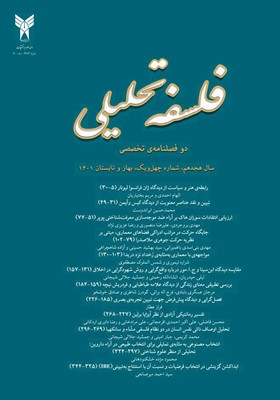تحلیل اوصاف ذاتی نفس انسان در دو نظام فلسفی مشّاء و سانکهیا
محورهای موضوعی : فلسفه
محمد کریمی
1
![]() ,
جبار امینی
2
*
,
جمشید جلالی شیجانی
3
,
جبار امینی
2
*
,
جمشید جلالی شیجانی
3
![]()
1 -
2 -
3 -
کلید واژه: کمال اوّل, نفس ناطقه, قوای نفس, پوروشا, پراکریتی, تجرّد نفس, تعدّد نفوس,
چکیده مقاله :
در فلسفه ی یونان، متفکّران متأخّر از سقراط بیش از پیشینیان خود، به مبحث انسان شناسی توجه کردند و بهویژه در آثار ارسطو، مسائل مربوط بدان مبحث با روشمندی خاصّی ارائه شد. به موازات ایشان در شرق نیز، از همان ابتدا وجودشناسی در خدمت انسان شناسی قرار گرفت و از جمله در مکتب سانکهیا، توجه شایانی بدان شد. طبعاً در هر دو سنت فکری، شناخت نفس آدمی نسبت به جسم او از اهمیت و پیچیدگی بیشتری برخوردار بوده است. پژوهش پیش رو عهده دار تبیین اوصاف ذاتی نفس انسان از منظر پایه گذاران مکاتب یادشده به نحو تطبیقی است. ارسطو با آنکه نفس را مجرّد از هیولا و غیر جسمانی می دانست، آن را کمال اوّل جسم طبیعی آلی می پنداشت. در نظر او، نفس ناطقه ی انسان جامع قوای نفس نباتی و حیوانی نیز است. اما در نظر حکیم کاپی لا، نفس یا پوروشا واجد هویتی بسیار متعالی، فرامادّی و ازلی است که نه علت و صانع چیزی بود و نه معلول و مصنوع چیزی. پوروشا به تمامه مجرّد از مادّه یا پراکریتی، ولی محرّک آن برای پیدایش موجودات است. همچنین باور به تعدّد نفوس، لازمِ قهری تعریف نفس در تفکّر مشّائی است، ولی با توجه به اوصاف نفس در تفکّر سانکهیه، چنین ایده ای نادرست بهنظر می رسد، از این رو متفکّران سانکهیه دلایل متقنی به سود آن ارائه نکرده اند.
In Greek philosophy, the later thinkers of Socrates paid more attention to the subject of “anthropology” than their predecessors, and especially in the works of Aristotle, issues related to this subject were presented in a special way. In parallel with him in the East, “ontology” was at the service of “anthropology” from the very beginning, and it received considerable attention, including in the Sankehye school. Naturally, in both intellectual traditions, knowing the human soul has been more important and complex than the human body. The present research is responsible for explaining the intrinsic characteristics of the human soul from the perspective of the founders of the mentioned schools in a comparative way. Although Aristotle considered the soul to be abstract from the monster and the incorporeal, he considered it to be the first perfection of the organic natural body. In his view, the rational soul of man was also the sum of the powers of the vegetable and animal souls. But according to the sage Capila, the soul or Purusha has a very transcendent, transcendental and eternal identity which was neither the cause and the creator of something nor the effect and artifact of something. Purusha is entirely abstract from matter or precreity, but it is the stimulus for the emergence of beings. Belief in the multiplicity of populations is also a necessary necessity for the definition of the soul in peripatetic thought, but considering the attributes of the soul in Sankehya thought, the idea of multiplicity seems very strange.
_||_

